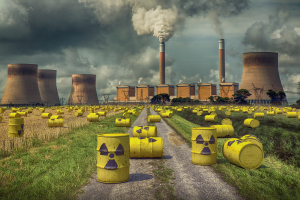
Vienna/Washington: Russian President Vladimir Putin’s threat of potential use of tactical nuclear weapons notwithstanding, the International Atomic Energy Agency (IAEA) today warned that Ukraine’s Zaporizhzhia Nuclear Power Plant (ZNPP) has lost its last remaining external power source due to renewed shelling and is now relying on emergency diesel generators for the electricity it needs for reactor cooling and other essential nuclear safety and security functions.
Shelling damaged a power line providing electricity to reactor unit 6 at Ukraine’s Zaporizhzhya Nuclear Power Plant (ZNPP) on October 6, forcing the unit to temporarily rely on its emergency diesel generators instead.
“The resumption of shelling, hitting the plant’s sole source of external power, is tremendously irresponsible. The Zaporizhzhia Nuclear Power Plant must be protected,”IAEA Director-General Rafael Mariano Grossi said today, adding that “I will soon travel to the Russian Federation, and then return to Ukraine, to agree on a nuclear safety and security protection zone around the plant. This is an absolute and urgent imperative”.
Citing official information from Ukraine, as well as reports from the team of IAEA experts present at the site of Europe’s largest nuclear power plant, IAEA Director-General Rafael Mariano Grossi, said the ZNPP’s connection to the 750 kilovolt (kV) power line was cut at around 1 am local time today.
Sixteen of the plant’s diesel generators started operating automatically, providing its six reactors with power. After the situation stabilised, ten of the generators were switched off, leaving six to provide the reactors with the necessary electricity.
All the plant’s safety systems continue to receive power and are operating normally, the IAEA experts were informed by senior Ukrainian operating staff at the site. Although the six reactors are in cold shutdown, they still require electricity for vital nuclear safety and security functions. The plant’s diesel generators each have sufficient fuel for at least ten days. ZNPP engineers have begun work to repair the damaged 750 kV power line, Grossi informed.
Earlier, the President of the United States of America, Joe Biden, told Democratic Party donors late on Thursday, October 6, 2022 (local time), that Russian President Vladimir Putin was “not joking when he talks about the potential use of tactical nuclear weapons or biological or chemical weapons, because his military is, you might say, significantly underperforming”.
The US President went on to warn of the risk of nuclear “Armageddon”, which he said was at its highest since the Cuban Missile Crisis in 1962. Elaborating Biden’s remarks, the US State Department deputy spokesperson Vedant Patel told reporters last night (local time) that Biden’s comments were “indicative of how seriously we take these threats and how mindful we are of them, and we’re continuing to monitor the situation very carefully and we’re staying in close consultation with our allies and partners on this”.
The United States stated that this kind of irresponsible rhetoric was not something that should be coming from a leader of an armed nuclear state. “It’s no way that such a leader [Putin] should speak. But we have not seen any reason to adjust our own strategic nuclear posture and nor do we have any indication that Russia is preparing to eminently use nuclear weapons,” Patel said.
Significantly, Washington dismissed a suggestion by Ukrainian President Volodymyr Zelenskyy that the West ought to do preemptive strikes. Patel said President Biden and the US Secretary of State Antony J Blinken were “very clear” about this, that so as long as the United States or its allies were not attacked, the USA was not going to get directly engaged in this conflict either by putting American troops to fight in Ukraine or attacking Russian forces.
White House spokesperson Karine Jeane-Pierre too claimed that the US did not see any reason to adjust its own nuclear posture, “nor do we have any indications that Russia is preparing to eminently use nuclear weapons”.
Earlier, even Indian Prime Minister Narendra Modi in course of his telephonic conversation with Ukrainian President Volodymyr Zelenskyy, on August 4, 2022, had underlined that endangerment of nuclear facilities could have far-reaching and catastrophic consequences for public health and the environment. Modi emphasized the importance India attaches to the safety and security of nuclear installations, including in Ukraine.
Top: Illustrative photo
– global bihari bureau




